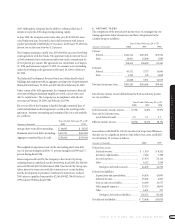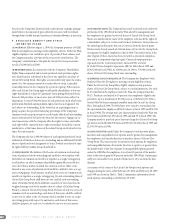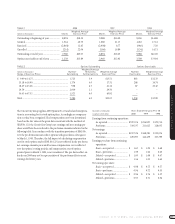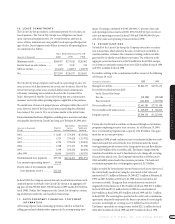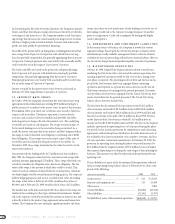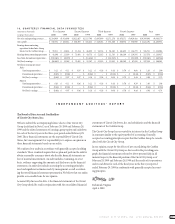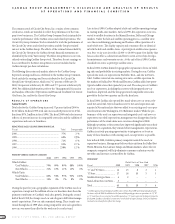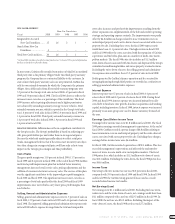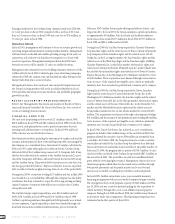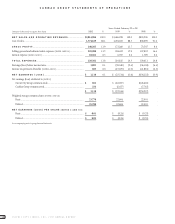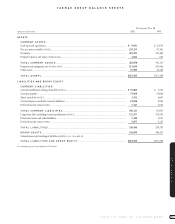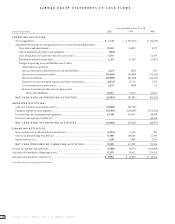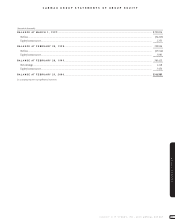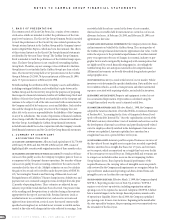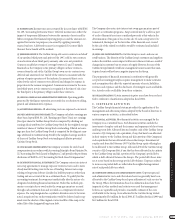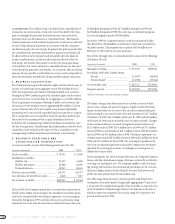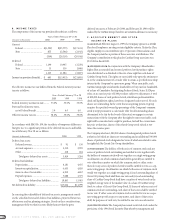CarMax 2000 Annual Report Download - page 68
Download and view the complete annual report
Please find page 68 of the 2000 CarMax annual report below. You can navigate through the pages in the report by either clicking on the pages listed below, or by using the keyword search tool below to find specific information within the annual report.
CIRCUIT CITY STORES, INC. 2000 ANNUAL REPORT
66
Earnings attributed to the CarMax Group common stock were $256,000,
or 1 cent per share, in fiscal 2000,compared with a net loss of $5.5 mil-
lion,or 24 cents per share,in fiscal 1999 and a net loss of $7.8 million,or
35 cents per share in fiscal 1998.
Operations Outlook
In fiscal 2001,management will continue to focus on revenue growth and
operating margin enhancement in existing CarMax markets. Management
will concentrate on the hub and satellite operating strategy for its used-car
superstores and seek new-car franchises to integrate or co-locate with
used-car superstores. Management anticipates that in fiscal 2001 and
beyond new stores will be smaller “A”stores or satellite locations.
Management also remains focused on building consumer awareness of the
CarMax offer. In fiscal 2000,CarMax began a new advertising campaign;
enhanced its Web site,carmax.com; and launched an online buying service
that provides firm prices on new vehicles.
Management believes that continued sales and profit improvement in
the Group’s existing markets will result in solid profitability in fiscal
2001 and allow the Group to resume moderate and profitable geographic
growth thereafter.
RECENT ACCOUNTING PRONOUNCEMENTS
Refer to the “Management’s Discussion and Analysis of Results of Opera-
tions and Financial Condition”for Circuit City Stores, Inc.for a review of
recent accounting pronouncements.
FINANCIAL CONDITION
Net cash used in operating activities was $25.1 million in fiscal 2000,
$82.0 million in fiscal 1999 and $86.1 million in fiscal 1998. For the three-
year period,cash primarily was used to purchase inventory for store
openings and additional new-car franchises. In fiscal 1999 and fiscal
1998,cash also was used to fund net losses.
Most financial activities,including the investment of surplus cash and the
issuance and repayment of short-term and long-term debt,are managed by
the Company on a centralized basis. Investment of surplus cash from the
February 1997 equity offering has been allocated to the CarMax Group.
Allocated debt of the CarMax Group consists of (1) Company debt,if any,
that has been allocated in its entirety to the CarMax Group and (2) a por-
tion of the Company’s debt that is allocated between the Circuit City Group
and the CarMax Group. This pooled debt bears interest at a rate based on
the average pooled debt balance. Expenses related to increases in pooled
debt are reflected in the weighted average interest rate of the pooled debt.
During fiscal 2000, a term loan totaling $175 million and due in May 2000
was classified as a current liability. Although the Company has the ability
to refinance this loan,it intends to repay the debt using existing working
capital. Payment of corporate debt will not necessarily reduce CarMax
Group allocated debt.
The CarMax Group’s capital expenditures were $45.4 million in fiscal
2000,$138.3 million in fiscal 1999 and $234.3 million in fiscal 1998.
CarMax’s capital expenditures through fiscal 2000 primarily were related
to store expansion. Capital expenditures have been funded through sale-
leaseback transactions,landlord reimbursements,proceeds from the
February 1997 CarMax Group equity offering and allocated short- and
long-term debt. In fiscal 2001, the Group anticipates capital expenditures
of approximately $30 million. Sale-leaseback and landlord reimburse-
ment transactions totaled $25.3 million in fiscal 2000,$139.3 million in
fiscal 1999 and $98.1 million in fiscal 1998.
During fiscal 2000, the CarMax Group acquired the Chrysler-Plymouth-
Jeep franchise rights and the related assets of Prince Chrysler-Plymouth-
Jeep Company and the franchise rights and the related assets of LAX
Dodge,Inc.in the Los Angeles market; the Jeep franchise rights and the
related assets of Red Bird Jeep-Eagle and the franchise rights of Hilltop
Chrysler-Plymouth,Inc.in the Dallas market; the franchise rights and
related assets of Fairway Chrysler-Plymouth-Jeep,Inc.in the Orlando mar-
ket; and the Nissan franchise rights and related assets of Town & Country
Pontiac Nissan,Inc.in the Washington D.C./Baltimore market for a total
of $34.8 million. These acquisitions were financed through cash resources.
Costs in excess of the acquired net tangible assets,which are primarily
inventory,have been recorded as goodwill and covenants not to compete.
During fiscal 1999, the CarMax Group acquired the Toyota franchise
rights and the related assets of Laurel Automotive Group,Inc.in the
Washington,D.C./Baltimore market; the franchise rights and the related
assets of Mauro Auto Mall,Inc.in the Chicago market; the franchise rights
and the related assets of Nissan of Greenville, Inc.in the Greenville,S.C.,
market; and the Mitsubishi franchise rights and the related assets of
Boomershine Automotive, Inc.in the Atlanta market for a total of $49.6
million. The acquisitions were financed through cash payments totaling
$41.6 million and the issuance of two promissory notes totaling $8.0 million.
Costs in excess of the acquired net tangible assets,which are primarily
inventory,were recorded as goodwill and covenants not to compete.
In fiscal 1996,Circuit City Stores, Inc.initiated an asset securitization
program on behalf of the CarMax Group. At the end of fiscal 2000,that
program allowed the transfer of up to $500 million in automobile loan
receivables. In October 1999,the Company formed a second securitiza-
tion facility on behalf of the CarMax Group that allowed for a $644 mil-
lion securitization of automobile loan receivables in the public market. At
February 29, 2000, the program had a capacity of $559.5 million. Securi-
tized receivables on behalf of the CarMax Group totaled $887.2 million at
the end of fiscal 2000. The receivables are sold to an unaffiliated third
party with the servicing rights retained. Management expects that secu-
ritization programs which allow for the transfer of receivables through
both private placement and the public market can be used to fund
increases in receivables resulting from CarMax’s continued growth.
In fiscal 1999,CarMax entered into a one-year,renewable inventory
financing arrangement with an asset-backed commercial paper conduit.
The arrangement had a total program capacity of $160 million at Febru-
ary 29,2000,and was created to provide funding for the acquisition of
vehicle inventory through the use of a non-affiliated special purpose
company. During fiscal 2000 and fiscal 1999, the CarMax Group financed
no inventory under this arrangement. This financing arrangement was
terminated in the first quarter of fiscal 2001.



